Early Intervention: reflexions upon the development of blind children up to two years of age
DOI:
https://doi.org/10.5216/rpp.v7i1.68Abstract
This article reflects upon the process of child development in blind children aged up to two years old (sensor-motor period): their acquisition of motor skills such as the development of grabbing, language, the notion of object, the mother-child attachment, and an analysis of the assessment program for early intervention. This reflexion shows that child development happens through movement, which facilitates the structuring of thought and language, as well as the child’s relationship with the environment and other people, especially their mothers. An analysis of the program shows that its success depends on the assessment given directly to the child, with frequent and continuous work done at home, as well as the assessment given to the family, throught orientation and joint efforts. KEY-WORDS: sensor-motor development - assessment program for early intervention - blind children.Downloads
Download data is not yet available.
Published
2006-11-15
How to Cite
CARNEIRO DE FARIAS, Gérson. Early Intervention: reflexions upon the development of blind children up to two years of age. Pensar a Prática, Goiânia, v. 7, n. 1, p. 85–102, 2006. DOI: 10.5216/rpp.v7i1.68. Disponível em: https://revistas.ufg.br/fef/article/view/68. Acesso em: 10 feb. 2026.
Issue
Section
Artigos de Revisão




